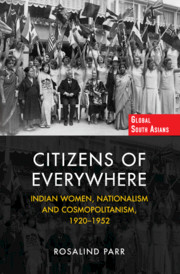Book contents
- Frontmatter
- Dedication
- Contents
- List of Figures
- Acknowledgements
- Note on Spelling
- List of Abbreviations
- Introduction: Cosmopolitanism, Nationalism and the Global Public Sphere
- 1 The Cosmopolitan-Nationalism of Sarojini Naidu
- 2 Suffrage; Solidarity
- 3 Becoming Global Citizens
- 4 Breaking America
- 5 A Changing World Order?
- 6 Defining Human Rights
- Conclusion
- Appendix 1 Dramatis Personae
- Appendix 2 The Universal Declaration of Human Rights
- Bibliography
- Index
2 - Suffrage; Solidarity
Published online by Cambridge University Press: 06 August 2021
- Frontmatter
- Dedication
- Contents
- List of Figures
- Acknowledgements
- Note on Spelling
- List of Abbreviations
- Introduction: Cosmopolitanism, Nationalism and the Global Public Sphere
- 1 The Cosmopolitan-Nationalism of Sarojini Naidu
- 2 Suffrage; Solidarity
- 3 Becoming Global Citizens
- 4 Breaking America
- 5 A Changing World Order?
- 6 Defining Human Rights
- Conclusion
- Appendix 1 Dramatis Personae
- Appendix 2 The Universal Declaration of Human Rights
- Bibliography
- Index
Summary
We organised women of India … have the primary right not only of voicing the opinion of Indian women, but also of knowing what measures are most suited to ameliorate our conditions.
In December 1934, two British women arrived in Karachi to attend the ninth annual conference of the All-India Women's Conference (AIWC). Margery Corbett Ashby, President of the International Alliance of Women for Suffrage and Equal Citizenship (IAWSEC), and Agnes Maude Royden, a pacifist and suffragist, had been invited as part of a wider effort to internationalise the AIWC. Their arrival by aeroplane after ‘only five days of flying with each night spent in a hotel on land’ seemed to symbolise a new technology-enabled connectedness. ‘Surely such journeys are miracles,’ marvelled the Irish co-founder of the AIWC, Margaret Cousins. Yet behind these high-minded sentiments were calculated strategic decisions. Congress members on the AIWC Standing Committee were engaged in an on-going, two-pronged campaign to establish the organisation as the legitimate representative of Indian women while, at the same time, promoting Indian independence to an international audience. As Amrit Kaur, the chief orchestrator of the visit, explained to colleagues, ‘[the British women's presence] gives our Conference international status and will have excellent repercussions on Govt's attitude towards us in future.’ Not only that, both women, it was hoped, would prove helpful in influencing public opinion in Britain and beyond. Corbett Ashby had widespread connections in international civil society and League of Nations circles, while Royden was a preacher at the City Temple in London with ‘immense power and no mean following’. Remotely from her home in the Punjab, Kaur micro-managed AIWC preparations for the visit and urged ‘the necessity of as many delegates as possible coming to Karachi in order to give these ladies a real idea of the strength of the woman's movement here’.
The British women's visit stemmed from a process initiated the previous year when a delegation, led by Kaur, appeared before the Joint Parliamentary Committee on the franchise. Alongside advancing suffrage demands, these representatives of the all-India women's movement capitalised on their presence in London to build alliances with a loose grouping of British women's organisations they came to identify as the ‘five friendly societies’. These relationships were not, as was the case with women such as Eleanor Rathbone, defined by maternalist imperial assumptions.
- Type
- Chapter
- Information
- Citizens of EverywhereIndian Women, Nationalism and Cosmopolitanism, 1920–1952, pp. 38 - 59Publisher: Cambridge University PressPrint publication year: 2021



